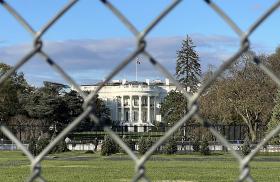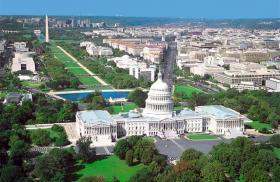
- Policy Analysis
- Articles & Op-Eds
With No Easy Fixes for Middle East Studies, It’s Time for New Programs
Also published in Mosaic

Existing programs are plagued by a broken tenure system, suspect foreign donors, Hamas apologists, and other ailments, but new programs at up-and-coming universities can help the field return to practical, non-ideological scholarship and respect for civil discourse.
As an undergraduate at Duke University over 40 years ago, I took advantage of a major that no longer exists—Comparative Area Studies—to focus on history, religion, and politics in the Middle East and South Asia. In essence, I created my own personal course of study in “Arab and Islamic Studies.” My class on U.S. Middle East policy was taught by a smart, practical, problem-solving army veteran who had served on the State Department Policy Planning Staff and in its Bureau of Intelligence and Research. My year-long seminar on Mughal history was taught by a brilliant, self-effacing scholar after whom the American Historical Association later named an annual prize in South Asian history. My first Arabic instructor regrettably became a vocal BDS advocate, but that was many years after I left Durham; when I was there, she kept politics out of the classroom.
My collegiate years coincided with a tumultuous period in America’s engagement in the Middle East. This included the Iranian revolution and the ensuing hostage crisis that gripped the nation as well as the immediate post-Camp David era, when Israel’s Menachem Begin butted heads with both a Democratic and a Republican president. But despite a heated political context, my education was undisturbed by the region’s turmoil. I may have suffered through the worst two seasons of Mike Krzyzewski’s coaching career, but no one on campus blamed either the Zionist entity or a murky Jewish conspiracy for the Blue Devils’ going a combined 21-34 my junior and senior years.
Forty years after my graduation, Duke got fairly high marks for navigating the post-October 7 campus upheaval, but many peer schools failed, some abysmally so. Here, I am not just talking about the ugly violence and uglier anti-Semitism that rocked schools from UCLA to Columbia. I am talking about the debasement of the classroom itself at numerous supposedly elite universities.
Take, for example, the consortium of Middle East programs at major universities that actively participates in a wildly tendentious series of online “teach-ins” and podcasts called “Gaza in Context,” under the auspices of an organization called the Arab Studies Institute, which lists its headquarters as Beirut and Washington. On its Jadaliyya e-zine website, one can find listings of more than a hundred events since October 7, 2023, featuring a who’s who of Hamas apologists, BDS activists, and anti-Zionist conspiracists, under titles in which “genocide,” “settler-colonialism,” and “liberation” compete to be the most common word. And, scandalously, even today (August 15)—after all the hubbub over the Trump administration’s crackdown on higher education—the list of “co-organizers” still includes Harvard’s Center for Middle Eastern Studies, Columbia’s Center for Palestine Studies, Brown University’s Center for Middle East Studies, Georgetown’s Center for Contemporary Arab Studies, George Mason University’s Middle East and Islamic Studies Program, and both University of Chicago’s Center for Contemporary Theory and its Center for Middle Eastern Studies, among others. (Thankfully, Duke was not on this list.)
In my view, Middle Eastern-studies programs at these and many other schools are broken, beyond repair in any reasonable timeframe. That is because the core problem is not the university administration, though presidents, provosts, and deans are responsible for the drift that allowed this corruption of scholarship to occur, sometimes by the greedy courting of foreign donors with political agendas. Neither is the core problem the radicalism of the student body, though individual students are certainly responsible for some of the most outrageous post-October 7 acts of intimidation and violence.
Rather, the core problem is the tenure and appointments system that, at many schools, has allowed an increasingly extremist professoriate to perpetuate itself, one generation after the next, through control of doctoral programs, post-doctoral fellowships, instructor hiring, and eventual faculty promotion. Even if universities adopted a policy of radical disruption to the tenure system today, the current generation of tenured professors would have to retire before there is even a chance to fix what’s wrong. And there is no prospect of radical disruption on the horizon.
All, however, is not lost. In a country famous for both re-invention and competition, one solution is to provide our students with alternatives—new programs committed to the values that the old programs used to celebrate, including non-ideological scholarship, a respect for civil discourse, and a commitment to diversity of opinions. Up-and-coming universities with ambitions to break into the academic “big leagues” are ready to compete. Frustrated donors, angry that their generous gifts to Middle East- or Israel-studies programs were channeled into funding chairs for rabid Israel-haters or Muslim Brotherhood sympathizers, are primed for new projects. Outstanding instructors, often with policy or military experience that isn’t respected in many faculty lounges, are waiting to be recruited. And smart, savvy students, who know when their (or their families’) tuition dollars are being wasted, are poised to take a chance on programs that make up in content for what they lack in prestige.
In full partnership with Pepperdine University’s School of Public Policy, The Washington Institute for Near East Policy—the organization I direct—took a leap of faith and created just such a program, offering a fully accredited master’s degree in what we call “Middle East Policy Studies.” Classes begin today, with an impressive inaugural cohort of about 25 students. Our offer of full-tuition scholarships certainly got these students’ attention, but I believe the prospect of a different type of education—one infused with the values difficult to find today at established Middle East programs—is what closed the deal.
Ours is not the only possible model; nor, I hope, will ours be the only success of its type. With a mix of vision, grit, and persistence, the next decade could see numerous new initiatives take root. It is only natural that some will thrive and some won’t even survive, and along the way, the established schools will take notice. In the end, this process of re-invention cannot but be beneficial for the future of Middle Eastern studies in America.
Robert Satloff is The Washington Institute’s Segal Executive Director and Howard P. Berkowitz Chair in U.S. Middle East Policy. This article was originally published on the Tikvah website.



